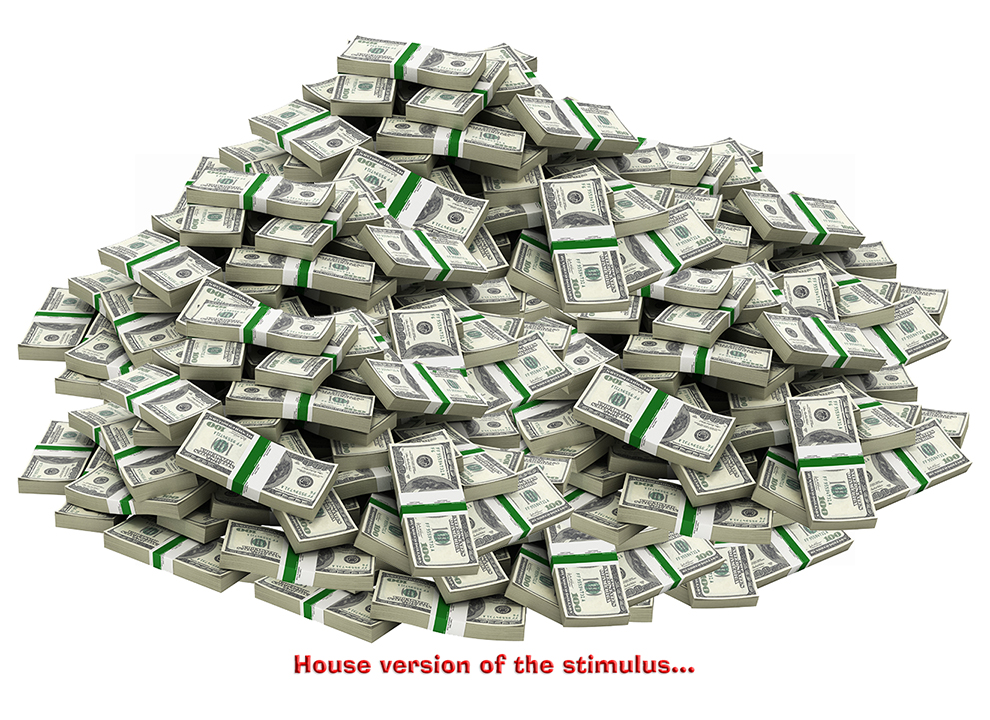We post news and comment on federal criminal justice issues, focused primarily on trial and post-conviction matters, legislative initiatives, and sentencing issues.

DON’T START TO FEEL TOO STIMULATED JUST YET
Congress left Washington, D.C. last Friday for its August recess without passing a supplemental stimulus bill. The Democrats are pushing the HEROES Act, passed by the House last May, which proposes $3.5 trillion in spending and includes a lot of beneficial provisions for federal prisoners. The Republican-controlled Senate favors the HEALS Act, which includes about $1 trillion in spending but nothing of the sentencing relief measures favored by the House.
 The HEROES Act provides that the Bureau of Prisons shall send to home confinement anyone who is 50 or over, is within 12 months of release, or has a list of COVID-19 risk conditions. Those conditions, which were just expanded for a second time by the Centers for Disease Control and Prevention on July 30, include pregnancy, heart disease, asthma, diabetes, HIV, cancer, sickle-cell anemia, respiratory problems, obesity, hypertension, or immune system weaknesses. The only exception are people who pose a specific and substantial risk of bodily injury to or to use violent force against another person.
The HEROES Act provides that the Bureau of Prisons shall send to home confinement anyone who is 50 or over, is within 12 months of release, or has a list of COVID-19 risk conditions. Those conditions, which were just expanded for a second time by the Centers for Disease Control and Prevention on July 30, include pregnancy, heart disease, asthma, diabetes, HIV, cancer, sickle-cell anemia, respiratory problems, obesity, hypertension, or immune system weaknesses. The only exception are people who pose a specific and substantial risk of bodily injury to or to use violent force against another person.
What’s more, courts would be required to reduce sentences for people unless the government can show by clear and convincing evidence that the defendant poses a risk of “serious, imminent injury” to an identifiable person. The Act also incorporates a reduction of the elderly offender home detention program sentence requirement (the subject of a separate bill that has already passed the House, H.R. 4018) to two-thirds of the sentence reduced by good time, instead of the current two-thirds of the whole sentence.
The Health, Economic Assistance, Liability Protection and Schools (HEALS) Act being pushed by the Senate is a mashup of eight other bills, none of which favors prisoners. What’s worse, HEALS’ stimulus package of an additional $1,200 per person is now withheld from people who were prisoners for every day of the 2020 calendar year.
Senate Democrats are trying to get the HEALS Act to require that phone calls from federal prisons remain free during the pandemic, which is a fig leaf (but not much of one) for prisoners.
No one knows whether a final bill, if there even is one, will include any of the House provisions.
 Several groups led by ACLU wrote to Senate and House leaders last week, urging that any stimulus package require the BOP to transfer vulnerable federal inmates to home confinement, clarify the authority of courts to order compassionate release based on COVID-19, and reduce the amount of time courts must wait before considering compassionate release motions during the pandemic. The letter also called on Congress to expand the elderly offender home detention program.
Several groups led by ACLU wrote to Senate and House leaders last week, urging that any stimulus package require the BOP to transfer vulnerable federal inmates to home confinement, clarify the authority of courts to order compassionate release based on COVID-19, and reduce the amount of time courts must wait before considering compassionate release motions during the pandemic. The letter also called on Congress to expand the elderly offender home detention program.
Finally, the House last week added an amendment to the 2021 Commerce, Justice, Science, and Related Agencies Appropriations bill which prohibits the BOP from collecting its 25% fee from halfway house or home confinement inmates. “For returning citizens lucky enough to find jobs, especially in the midst of a national pandemic and economic crisis,” Congresswoman Eleanor Holmes Norton (D-District of Columbia) said, “charging up to 25% of their income in unnecessary fees is not only unfair, it is counterproductive. Returning citizens could far better use this money to save for future rent, child support and fines and fees associated with their conviction, such as restitution.”
H.R. 6800, HEROES Act
S.4318 – American Workers, Families, and Employers Assistance Act
The Hill, Senate Democrats push to include free phone calls for incarcerated people in next relief package (August 6, 2020)
ACLU Leadership Conference, Open Letter to Senate and House Leaders (August 4, 2020)
Press Release, Norton Amendment Prohibiting Bureau of Prisons from Collecting Subsistence Fees from Returning Citizens Passes House (August 3, 2020)
– Thomas L. Root








